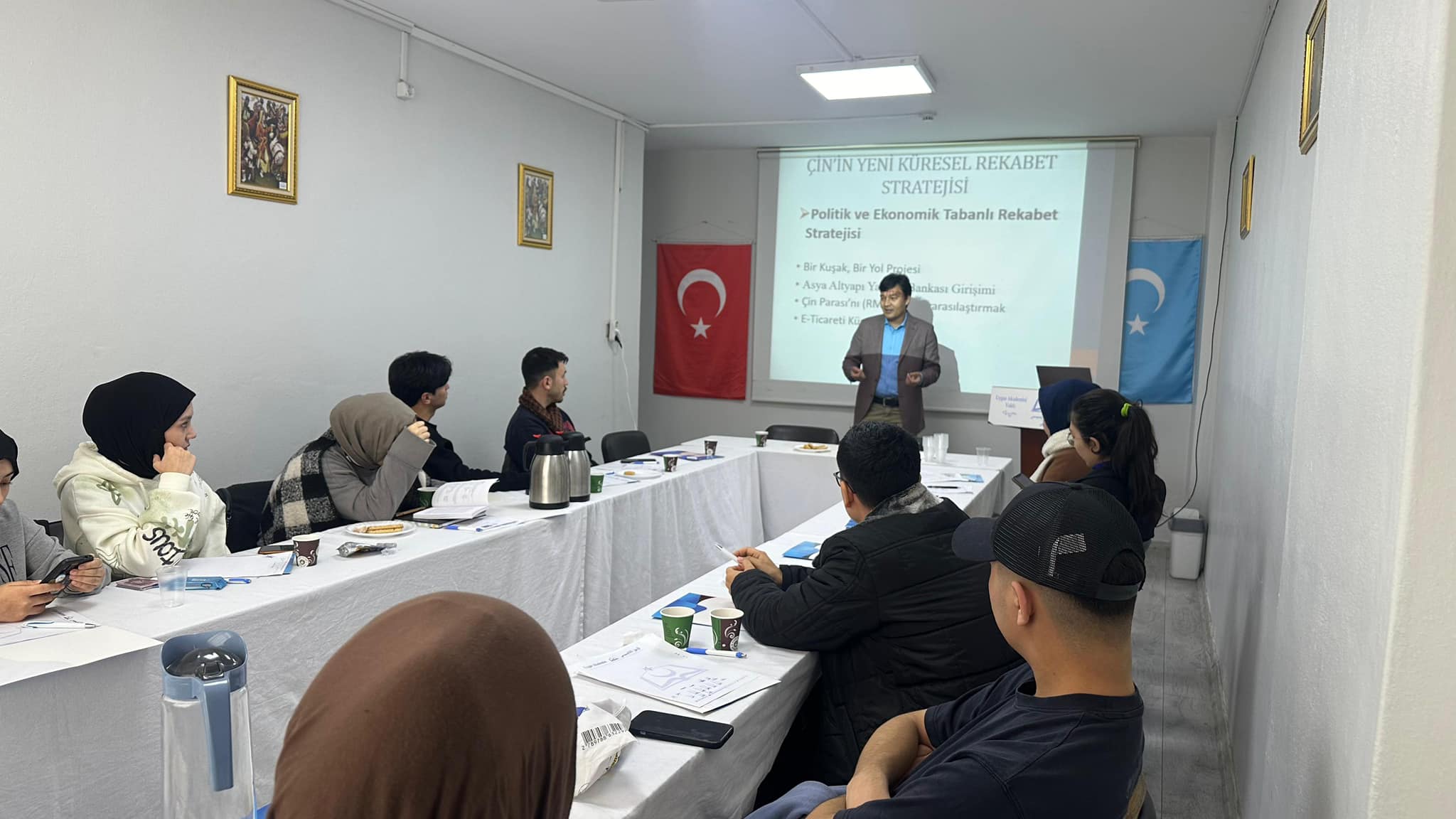Fourth Session of ‘International Conjuncture and National Struggle Methods’ Training Program Held in Istanbul
The fourth session of the long-term training program, “International Conjuncture and Methods of National Struggle,” organized by the Uyghur Academy to train young Uyghur leaders for the Uyghur cause, was held in Istanbul.
Designed to train young Uyghur leaders for the East Turkistan struggle, the program’s fourth session took place on January 25–26, 2025, at the Uyghur Academy’s Sefaköy office in Istanbul.
During the two-day program, researchers and activists, including Dr. Memtimin Bektur, Assoc. Prof. Dr. Alimcan Buğda, PhD student Abdullah Oğuz, Shamsikamer Artush, and Memettohtı Atavulla, addressed significant topics concerning Uyghurs and youth. Eighteen Uyghur university students from various cities across Turkey participated in the program.
State and Lobbying Movement
Dr. Memtimin Bektur, a faculty member at Istanbul Gelişim University, delivered a lecture titled “State and Lobbying Movement,” where he addressed Uyghur youth on the concepts of state governance and lobbying. He illustrated governance philosophy with examples from Yusuf Has Hacib, Aristotle, and Rousseau. Dr. Bektur defined lobbying as a method of advocating for specific groups’ interests within political systems and emphasized its role in modern democracies. He referenced Greek and Armenian lobbying activities during the Ottoman period and the Turkish lobbying movement initiated by the New York Turkish Relief Society in 1924.

Dr. Bektur stressed that success in lobbying activities hinges on the effective use of financial resources, citing examples like the Jewish lobby, which has had significant international impacts. He encouraged Uyghurs to develop effective lobbying strategies for their rightful struggle. At the end of his lecture, he highlighted the importance of political propaganda techniques and collaboration with strong allies in lobbying efforts.
Islamic Tradition in Uyghurs and Contemporary Islamic Movements
Assoc. Prof. Dr. Alimcan Buğda, a faculty member at Istanbul Civilization University and President of the East Turkistan Scholars Union, gave a talk titled “Islamic Tradition in Uyghurs and Today’s Islamic Movements.” He detailed the history of Uyghurs’ conversion to Islam and its influence on Uyghur culture. Dr. Buğda explained how the Battle of Talas (751) marked a turning point in the Turks’ conversion to Islam and discussed the Qarakhanid State’s adoption of Islam as its official religion.

He noted that Uyghurs continued pre-Islamic traditions by blending them with Islamic values, emphasizing the importance of preserving national customs in harmony with religious principles. Dr. Buğda also stressed the balanced preservation of religious and national identities, suggesting that the “middle way” in Islam offers solutions to modern challenges.
Diplomatic Relations of the Kashgar State with Britain and Russia
Abdullah Oğuz, Secretary General of the Isa Yusuf Alptekin Foundation and a PhD student, discussed East Turkistan’s historical independence struggles and diplomatic relations in his lecture, “Diplomatic Relations of the Kashgari State with Britain and Russia.” He provided an overview of the 250-year history of resistance since the Qing Dynasty’s occupation of East Turkistan, highlighting the region’s geopolitical significance and its role in the rivalry between Britain and Russia.

Oğuz emphasized the ties established with the Ottoman Empire during Yakup Beg’s reign, describing how the Kashgari State pledged allegiance to the Ottomans and was accepted as part of the empire. Addressing the complexities of modern international relations, he stressed the necessity for Uyghurs to define their strategic goals clearly to ensure the success of their national struggle.
New Strategies in the East Turkistan National Independence Struggle
Shamsikamer Artush, a former diplomat at the Turkish Embassy in Beijing, shared his vast diplomatic experience in a talk titled “New Strategies in the East Turkistan National Independence Struggle.” He pointed out the inefficiency of Uyghur organizations on the international stage and the ineffective use of financial resources. Artush underscored the significance of lobbying activities and the need for Uyghur organizations to establish a more united and structured framework.

Artush highlighted the importance of demonstrating to the global community that East Turkistan is an occupied state through academic reports and bringing this issue to the international agenda.
China’s Global Competitive Strategy
Researcher Memettohtı Atavulla analyzed China’s economic and political ambitions in his lecture, “China’s Global Competitive Strategy.” He focused on China’s “One Belt, One Road” initiative, which aims to expand its regional influence through infrastructure projects and trade routes.

Atavulla noted that China increases its global influence through higher military expenditures, technological advancements, and a “debt trap” strategy, while maintaining authoritarian domestic policies. He emphasized the importance of Uyghur youth understanding these strategies to take effective steps in their national struggle.
The fourth session of the Uyghur youth’s long-term training program on “International Conjuncture and Methods of National Struggle” concluded after two days of engaging lectures and interactive Q&A sessions.
These training courses will continue monthly, with each session lasting two days as session of the long-term program.
From Uygur News


